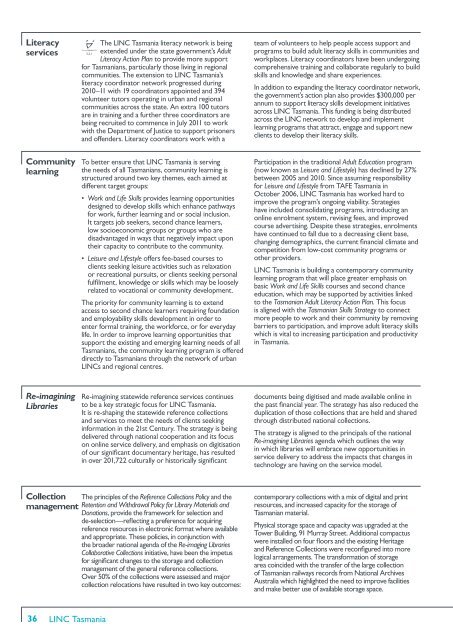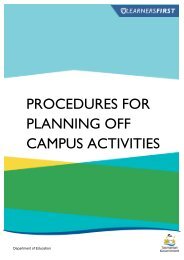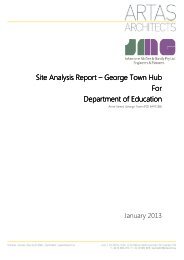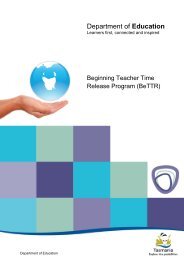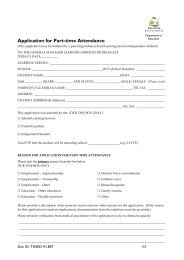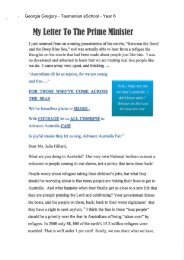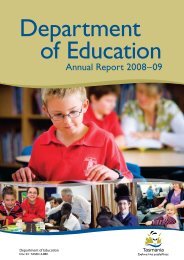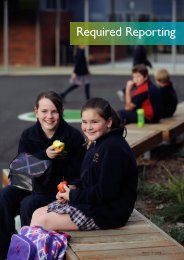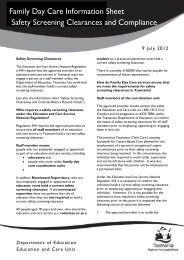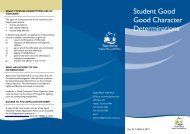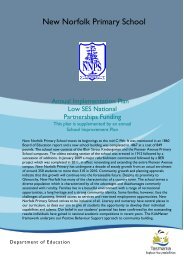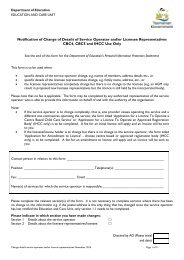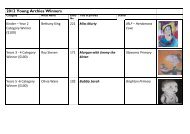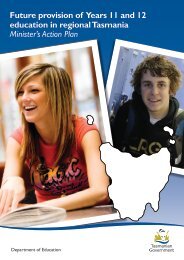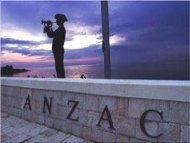Department of Education
DoE Annual Report 2010-2011 - Department of Education
DoE Annual Report 2010-2011 - Department of Education
- No tags were found...
You also want an ePaper? Increase the reach of your titles
YUMPU automatically turns print PDFs into web optimized ePapers that Google loves.
Literacy<br />
services<br />
The LINC Tasmania literacy network is being<br />
3.2.1<br />
extended under the state government’s Adult<br />
Literacy Action Plan to provide more support<br />
for Tasmanians, particularly those living in regional<br />
communities. The extension to LINC Tasmania’s<br />
literacy coordinator network progressed during<br />
2010–11 with 19 coordinators appointed and 394<br />
volunteer tutors operating in urban and regional<br />
communities across the state. An extra 100 tutors<br />
are in training and a further three coordinators are<br />
being recruited to commence in July 2011 to work<br />
with the <strong>Department</strong> <strong>of</strong> Justice to support prisoners<br />
and <strong>of</strong>fenders. Literacy coordinators work with a<br />
team <strong>of</strong> volunteers to help people access support and<br />
programs to build adult literacy skills in communities and<br />
workplaces. Literacy coordinators have been undergoing<br />
comprehensive training and collaborate regularly to build<br />
skills and knowledge and share experiences.<br />
In addition to expanding the literacy coordinator network,<br />
the government’s action plan also provides $300,000 per<br />
annum to support literacy skills development initiatives<br />
across LINC Tasmania. This funding is being distributed<br />
across the LINC network to develop and implement<br />
learning programs that attract, engage and support new<br />
clients to develop their literacy skills.<br />
Community<br />
learning<br />
To better ensure that LINC Tasmania is serving<br />
the needs <strong>of</strong> all Tasmanians, community learning is<br />
structured around two key themes, each aimed at<br />
different target groups:<br />
• Work and Life Skills provides learning opportunities<br />
designed to develop skills which enhance pathways<br />
for work, further learning and or social inclusion.<br />
It targets job seekers, second chance learners,<br />
low socioeconomic groups or groups who are<br />
disadvantaged in ways that negatively impact upon<br />
their capacity to contribute to the community.<br />
• Leisure and Lifestyle <strong>of</strong>fers fee-based courses to<br />
clients seeking leisure activities such as relaxation<br />
or recreational pursuits, or clients seeking personal<br />
fulfilment, knowledge or skills which may be loosely<br />
related to vocational or community development.<br />
The priority for community learning is to extend<br />
access to second chance learners requiring foundation<br />
and employability skills development in order to<br />
enter formal training, the workforce, or for everyday<br />
life. In order to improve learning opportunities that<br />
support the existing and emerging learning needs <strong>of</strong> all<br />
Tasmanians, the community learning program is <strong>of</strong>fered<br />
directly to Tasmanians through the network <strong>of</strong> urban<br />
LINCs and regional centres.<br />
Participation in the traditional Adult <strong>Education</strong> program<br />
(now known as Leisure and Lifestyle) has declined by 27%<br />
between 2005 and 2010. Since assuming responsibility<br />
for Leisure and Lifestyle from TAFE Tasmania in<br />
October 2006, LINC Tasmania has worked hard to<br />
improve the program’s ongoing viability. Strategies<br />
have included consolidating programs, introducing an<br />
online enrolment system, revising fees, and improved<br />
course advertising. Despite these strategies, enrolments<br />
have continued to fall due to a decreasing client base,<br />
changing demographics, the current financial climate and<br />
competition from low-cost community programs or<br />
other providers.<br />
LINC Tasmania is building a contemporary community<br />
learning program that will place greater emphasis on<br />
basic Work and Life Skills courses and second chance<br />
education, which may be supported by activities linked<br />
to the Tasmanian Adult Literacy Action Plan. This focus<br />
is aligned with the Tasmanian Skills Strategy to connect<br />
more people to work and their community by removing<br />
barriers to participation, and improve adult literacy skills<br />
which is vital to increasing participation and productivity<br />
in Tasmania.<br />
Re-imagining<br />
Libraries<br />
Re-imagining statewide reference services continues<br />
to be a key strategic focus for LINC Tasmania.<br />
It is re-shaping the statewide reference collections<br />
and services to meet the needs <strong>of</strong> clients seeking<br />
information in the 21st Century. The strategy is being<br />
delivered through national cooperation and its focus<br />
on online service delivery, and emphasis on digitisation<br />
<strong>of</strong> our significant documentary heritage, has resulted<br />
in over 201,722 culturally or historically significant<br />
documents being digitised and made available online in<br />
the past financial year. The strategy has also reduced the<br />
duplication <strong>of</strong> those collections that are held and shared<br />
through distributed national collections.<br />
The strategy is aligned to the principals <strong>of</strong> the national<br />
Re-imagining Libraries agenda which outlines the way<br />
in which libraries will embrace new opportunities in<br />
service delivery to address the impacts that changes in<br />
technology are having on the service model.<br />
Collection The principles <strong>of</strong> the Reference Collections Policy and the<br />
management Retention and Withdrawal Policy for Library Materials and<br />
Donations, provide the framework for selection and<br />
de-selection—reflecting a preference for acquiring<br />
reference resources in electronic format where available<br />
and appropriate. These policies, in conjunction with<br />
the broader national agenda <strong>of</strong> the Re-imaging Libraries<br />
Collaborative Collections initiative, have been the impetus<br />
for significant changes to the storage and collection<br />
management <strong>of</strong> the general reference collections.<br />
Over 50% <strong>of</strong> the collections were assessed and major<br />
collection relocations have resulted in two key outcomes:<br />
contemporary collections with a mix <strong>of</strong> digital and print<br />
resources, and increased capacity for the storage <strong>of</strong><br />
Tasmanian material.<br />
Physical storage space and capacity was upgraded at the<br />
Tower Building, 91 Murray Street. Additional compactus<br />
were installed on four floors and the existing Heritage<br />
and Reference Collections were reconfigured into more<br />
logical arrangements. The transformation <strong>of</strong> storage<br />
area coincided with the transfer <strong>of</strong> the large collection<br />
<strong>of</strong> Tasmanian railways records from National Archives<br />
Australia which highlighted the need to improve facilities<br />
and make better use <strong>of</strong> available storage space.<br />
36<br />
LINC Tasmania


